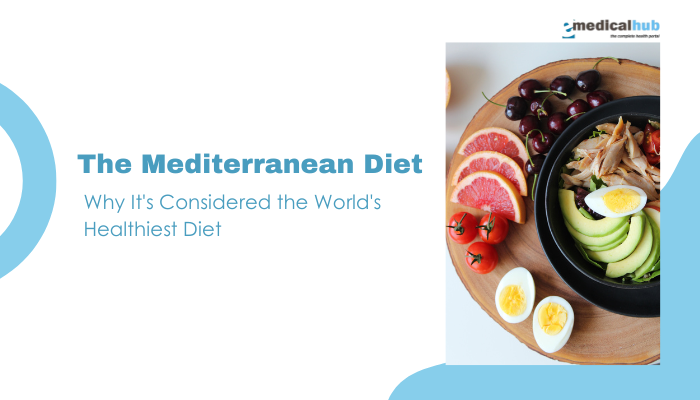Introduction
The Mediterranean Diet has gained global acclaim, lauded by nutrition experts, dietitians, and physicians as one of the healthiest dietary patterns. Characterized by generous use of olive oil, abundant fruits and vegetables, whole grains, legumes, moderate fish intake, and relatively low red meat consumption, it’s rooted in the traditional eating habits of countries bordering the Mediterranean Sea.
Many studies link this diet to a lower risk of cardiovascular disease, improved metabolic health, and longer lifespan. But what sets the Mediterranean Diet apart from other eating plans? Why do so many health organizations champion it as a gold standard for balanced nutrition?
This article explores the foundational elements of the Mediterranean Diet, the science behind its multiple health benefits, and tips for integrating it into your own lifestyle. You’ll discover how simple shifts, like incorporating more olive oil or nuts into daily meals, can yield significant improvements in overall wellness. If you’re intrigued by a diet that is both delicious and thoroughly backed by evidence, read on to learn why the Mediterranean Diet stands as an enduring model for healthy living.
Disclaimer: The following is for general educational use only and does not replace medical or nutritional advice. If you have specific health conditions or dietary concerns, consult a qualified healthcare professional for personalized recommendations.
Origins and Key Principles
Historical Context
Originally observed in the mid-20th century by researchers such as Ancel Keys, the Mediterranean Diet is not a single uniform regimen. Rather, it reflects the traditional culinary patterns of regions like southern Italy, Greece, Spain, and parts of the Middle East. In these areas:
- Physical activity was integral—people walked, farmed, fished, or performed manual labor.
- Seasonal, local foods were the norm—fresh produce, grains, olives, fish, occasionally small amounts of meat.
As modernization spread, some original Mediterranean communities drifted away from these habits. However, many nutrition scientists and public health advocates embraced the concept to define what’s now widely known as the Mediterranean Diet.
Core Components
- Abundance of Plant Foods: Vegetables, fruits, whole grains, legumes, nuts, and seeds serve as the foundation.
- Olive Oil: The primary source of fat, used for cooking and dressings.
- Moderate Protein: Lean sources like fish and poultry are more common than red meats. Eggs and dairy—especially fermented dairy like yogurt—are included but in modest portions.
- Limited Red Meat and Sweets: Typically reserved for special occasions or small amounts.
- Moderate Wine Consumption: Often red wine, sipped with meals. This element is optional and context-dependent, not advisable for all populations.
- Seasonal, Fresh, and Less Processed: Minimally refined or processed foods, focusing on flavor from herbs, garlic, onion, rather than heavy sauces or added sugar.
At its heart, the diet is about variety, quality, and balance, rather than strict macro or calorie tracking.
Health Benefits: An Evidence-Based Overview
Cardiovascular Health
One of the most robust findings:
- Lower Risk of Heart Disease: Large studies, like the Seven Countries Study and the PREDIMED trial, show that those following a Mediterranean-style diet experience reduced incidence of coronary heart disease and stroke.
- Improved Lipid Profiles: Higher intake of monounsaturated and polyunsaturated fats (olive oil, nuts, fish) can elevate HDL (“good” cholesterol) and moderate LDL.
- Anti-inflammatory Effects: Antioxidant-rich foods (olive oil polyphenols, vegetables, fruits) reduce chronic inflammation associated with atherosclerosis.
Weight Management and Metabolic Benefits
Several meta-analyses indicate that compared to low-fat diets, the Mediterranean Diet may be as effective or sometimes superior in weight control. It typically leads to better metabolic markers—like improved insulin sensitivity and lower waist circumference—partly due to the synergy of fiber, healthy fats, and reduced sugar intake.
Diabetes Prevention and Management
The fiber from legumes, whole grains, and vegetables helps maintain stable blood sugar levels, while monounsaturated fats enhance insulin sensitivity. Many prospective studies link the Mediterranean eating pattern with lower risk of type 2 diabetes, or better glycemic control in those already diagnosed.
Brain and Cognitive Health
Emerging evidence suggests a positive association between Mediterranean Diet adherence and cognitive function:
- Reduced Cognitive Decline: Observational data indicate lower rates of Alzheimer’s or mild cognitive impairment.
- Possible Mechanisms: The combination of antioxidants (polyphenols, vitamins) and anti-inflammatory fats might protect neural pathways.
Longevity and Overall Mortality
Blue Zones research, including some Mediterranean regions (e.g., Ikaria in Greece, Sardinia in Italy), highlights diets grounded in produce, beans, and olive oil as a key factor in extended lifespans. Additionally, numerous cohort studies confirm that the Mediterranean approach correlates with a reduced risk of premature death from various chronic diseases.
Unique Nutritional Components
Olive Oil: The Heart of Mediterranean Cooking
Extra virgin olive oil is high in monounsaturated fats and contains polyphenols with antioxidant properties. This oil:
- Promotes Cardiovascular Health: Lowers LDL oxidation and may raise HDL.
- Versatile in Cooking: Used for sautés, roasting, or simply drizzling over salads or bread.
Herbs, Spices, and Flavor Enhancers
Using a broad array of herbs (oregano, basil, rosemary) and spices (garlic, paprika, cumin) reduces the reliance on salt or sugar. These can deliver anti-inflammatory compounds and additional health benefits.
Plant-Forward Proteins
Beans, lentils, and chickpeas provide ample plant protein and fiber, offsetting the need for large amounts of meat. This approach saves on saturated fat and fosters stable glucose levels.
Whole Grains and Minimal Refinement
Refined flours and sugar are not central. Instead, the diet features whole wheat breads, barley, bulgur, or farro, delivering vitamins, minerals, and fiber. Minimal processing helps maintain nutrient integrity.
Adaptability and Cultural Variations
Regional Differences
- Greece: A robust usage of vegetables (eggplant, zucchini), olive oil, feta cheese, legumes, moderate fish, moderate red wine.
- Italy: Pasta in moderate portions, tomato-based sauces with olive oil, abundant vegetables, herbs, and moderate dairy like parmesan.
- Spain: Tapas culture with fish, shellfish, olive oil, tomatoes, saffron-based dishes like paella.
- North Africa / Middle East: Couscous, chickpeas, lentils, spices, also featuring olive oil, local produce.
All revolve around fresh produce, herbs, moderate meat, and social mealtimes. The main pillars remain consistent.
Vegetarian or Vegan Adaptations
It’s entirely possible to keep Mediterranean principles while avoiding meat, poultry, or even fish:
- Rely Heavily on Legumes: Beans, lentils, chickpeas as protein anchors.
- Add Tofu, Tempeh for variety, though not traditionally Mediterranean, it can meld with the cooking style.
- Boost Nuts and Seeds for healthy fats in place of fish-based omega-3. Possibly supplement with algae-based DHA/EPA if needed.
Practical Steps to Start a Mediterranean Diet
Stock the Kitchen with Essentials
- Olive Oil: Extra virgin for salads and finishing, a lighter version for cooking if desired.
- Legumes: Chickpeas, lentils, beans in dried or canned form.
- Whole Grains: Oats, barley, brown rice, whole-wheat pasta or bread.
- Fresh Veggies and Fruit: Seasonal produce for daily variety.
- Nuts and Seeds: Almonds, walnuts, pistachios, sunflower seeds.
- Lean Proteins: Fish, poultry, eggs (if not vegetarian). Tofu or seitan for plant-based.
Meal Composition
- Fill Half the Plate with Vegetables or a combination of vegetables and fruit.
- Include Whole Grain or starchy vegetable (like potatoes, sweet potatoes).
- Protein: A moderate portion of fish, legumes, or poultry.
- Top or Cook with Olive Oil: Replacing butter or heavy cream.
- Use Herbs generously for flavor.
Cooking Strategies
- Embrace Simplicity: Mediterranean meals are often simple—think grilled fish, a side of roasted vegetables, drizzle of olive oil, fresh herbs, a wedge of lemon.
- Salads with Every Meal: A typical approach is pairing a main dish with side salads or raw vegetables.
- Spice, Not Salt: Rely on garlic, onion, oregano, thyme, basil, parsley, rosemary, or pepper for flavor. Minimal salt can be used judiciously, but the aromatic nature of the dishes reduces reliance on heavy sodium.
Common Pitfalls and Myths
“It’s All About Pasta and Bread”
While these foods appear, portion sizes are typically smaller than standard Western servings, balanced by abundant vegetables, beans, or fish. Also, many people incorrectly load pasta with cream-based sauces. Traditional Mediterranean style uses light tomato-based sauces, olive oil, and fresh herbs.
Overindulgence in Wine
Yes, moderate red wine consumption is classic in some regions. However, “moderate” typically means 1 glass a day for women or 1-2 for men, with meals. Overconsumption negates health benefits and raises heart, liver, or addiction risks.
Replacing All Fats with Olive Oil
While olive oil is central, saturated fat from cheese or occasional butter can appear in small amounts. The key is predominantly using unsaturated fats and limiting saturated or trans fats. Overdosing on olive oil still adds calories, so portion control is wise.
Evidence Against the Mediterranean Diet?
Critiques and Considerations
Some critics question whether modern expansions of the Mediterranean Diet (like adding processed gluten-free breads, refined cereals) truly preserve original traditions. Also, not all RCTs yield uniform results—some populations may see less dramatic improvements if their baseline diet was already quite healthy. Additionally, cultural feasibility can be an issue in regions with different staple foods or cooking styles.
Potential Allergens or Intolerances
- Gluten Sensitivity: The diet often includes bread, pasta, cereals. Substitutions (e.g., gluten-free whole grains like brown rice, quinoa) can maintain the approach.
- Dairy Sensitivity: Some forms (like feta or yogurt) are integral in certain cultures. Dairy-free alternatives exist if needed.
Frequently Asked Questions (FAQ)
Is the Mediterranean Diet suitable for weight loss?
Yes, many find it helps with weight management due to high satiety from fiber, healthy fats, and ample produce. Weight loss occurs if there’s a mild calorie deficit. Mindful portion control remains important.
Do I need expensive olive oil or special ingredients?
Quality olive oil helps flavor and health benefits, but you can adapt to local produce or oils. The principle of fresh, whole foods is more crucial than brand specifics or fancy products.
Can I do a Mediterranean Diet if I’m vegetarian or vegan?
Absolutely. Focus on beans, lentils, chickpeas, nuts, seeds, whole grains, and plenty of vegetables. Omit fish/poultry; rely on plant-based proteins and possibly supplement with plant-based omega-3 (algae).
How quickly do health benefits appear?
Some improvements—like better energy or mild weight changes—may appear in weeks. For deeper changes (cholesterol, blood pressure), allow months. Sustained adherence is key for long-term gains.
Is red wine mandatory?
No. Wine is optional. If you don’t drink alcohol, the diet still thrives with water, tea, or coffee. You can get polyphenols from grapes or berries without alcohol intake.
Conclusion
Celebrated as a blueprint for longevity and disease prevention, the Mediterranean Diet provides a sensible, flexible path to better health. Rooted in whole, minimally processed foods—especially vegetables, fruits, whole grains, legumes, olive oil, and moderate lean proteins—it fosters consistent energy, weight management, and reduced chronic disease risk. Scientific literature repeatedly confirms advantages for heart health, metabolic function, and possibly cognitive preservation.
Yet, adopting it is more than just recipes. The Mediterranean approach also emphasizes mindful eating habits, including social mealtimes, portion moderation, and a lifestyle that balances daily movement with restful downtime. Whether you adapt it fully—incorporating moderate wine, fish, olive oil, or simply adapt the core principles with local produce and plant-based proteins—it remains a robust, versatile framework. By focusing on fresh ingredients, balanced macronutrients, and a moderate mindset, the Mediterranean style can easily become both a delicious and sustainable choice for long-term health.
References
- Willett WC, Sacks F, Trichopoulou A, et al. Mediterranean diet pyramid: a cultural model for healthy eating. Am J Clin Nutr. 1995;61(6 Suppl):1402S-1406S.
- Estruch R, Ros E, Salas-Salvadó J, et al. Primary prevention of cardiovascular disease with a Mediterranean diet. N Engl J Med. 2013;368(14):1279-1290.
- Sofi F, Abbate R, Gensini GF, et al. Accruing evidence on benefits of adherence to the Mediterranean diet on health. Circulation. 2009;119(2):e380-6.
- Martinez-Gonzalez MA, Ros E, Estruch R, et al. Mediterranean diet and cardiovascular health. Circ Res. 2019;124(5):779-798.
- Misirli G, Benetou V, Lagiou P, et al. Relation of the traditional Mediterranean diet to cerebrovascular disease in a Mediterranean population. Am J Epidemiol. 2012;176(12):1185-92.
- Kantor ED, Rehm CD, Du M, et al. Trends in dietary supplement use among US adults. JAMA. 2016;316(14):1464-1474.
- Shannon OM, Stephan BCM, Granic A, et al. Mediterranean Diet and Cognitive Function in Older Adults. Nutrients. 2019;11(5):1079.
- Martinez-Gonzalez MA, Bulló M, et al. Effects of Mediterranean diets on body weight and glycemic control. Lancet Diabetes Endocrinol. 2018;6(7):E12.
- Menotti A, Puddu PE, et al. A “Mediterranean diet” chart. Nutr Metab Cardiovasc Dis. 2017;27(11):901-906.
- US News & World Report. Best Diet Rankings. 2023.
- USDA. MyPlate guidelines. 2022.
- EFSA. Food-based dietary guidelines in Europe. 2020.







